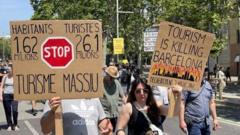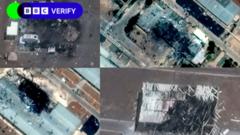As the conflict between Ukraine and Russia intensifies, Crimea finds itself increasingly isolated, with Ukrainian attacks targeting strategic infrastructure. Once a bustling destination with millions of visitors, the peninsula now serves mainly as a retreat for Russians amid ongoing hostilities.
Crimea: A Volatile Jewel Amidst the Ukraine-Russia Conflict

Crimea: A Volatile Jewel Amidst the Ukraine-Russia Conflict
The ongoing war has transformed Crimea into an isolated territory, primarily attracting Russian tourists while faced with consistent Ukrainian drone assaults.
In recent months, Ukraine has intensified its offensive operations against the Crimea bridge, employing a series of attacks designed to disrupt vital transport links. Just last week, Ukrainian forces deployed underwater explosives targeted at the bridge's support infrastructure. These operations compel temporary closures of the bridge, a critical passageway connecting the Russian mainland to the contested peninsula, often restricting traffic for several hours.
Since Russia's annexation of Crimea in 2014, the region has become a flashpoint, with little sign of resolution in the near future. Moscow claims that its actions in Crimea corrected a historical injustice, leading to persistent demands during peace negotiations for international recognition of its control over the territory—a condition Ukraine staunchly rejects.
Former President Trump's attempts to broker peace have drawn attention to potential U.S. acknowledgment of Russian sovereignty in Crimea, complicating an already delicate situation. With life in Crimea altered significantly by the war, the region has now morphed into a picturesque yet dangerous beach locale, primarily attracting Russian guests who often dismiss the ongoing conflict as a mere inconvenience. The prevailing sentiment, encapsulated in the nationalist slogan “Crimea is Ours,” reflects a tenuous peace amidst ongoing military tensions, limiting the area to a narrow influx of tourists against a backdrop of conflict.
Since Russia's annexation of Crimea in 2014, the region has become a flashpoint, with little sign of resolution in the near future. Moscow claims that its actions in Crimea corrected a historical injustice, leading to persistent demands during peace negotiations for international recognition of its control over the territory—a condition Ukraine staunchly rejects.
Former President Trump's attempts to broker peace have drawn attention to potential U.S. acknowledgment of Russian sovereignty in Crimea, complicating an already delicate situation. With life in Crimea altered significantly by the war, the region has now morphed into a picturesque yet dangerous beach locale, primarily attracting Russian guests who often dismiss the ongoing conflict as a mere inconvenience. The prevailing sentiment, encapsulated in the nationalist slogan “Crimea is Ours,” reflects a tenuous peace amidst ongoing military tensions, limiting the area to a narrow influx of tourists against a backdrop of conflict.




















